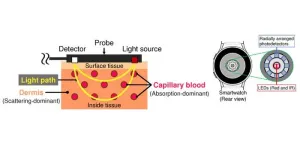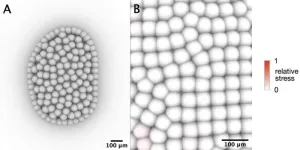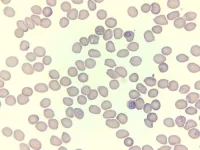(Press-News.org) Red deer may become less sociable as they grow old to reduce the risk of picking up diseases, while older house sparrows seem to have fewer social interactions as their peers die off, according to new research which shows humans are not the only animals to change our social behaviour as we age.
A collection of 16 studies, including six from the University of Leeds, have been published today as part of a special issue of the Philosophical Transactions of the Royal Society, investigating ageing and society across the natural world.
One study into red deer shows that as older female deer become less and less social with age, cutting down on competition and reducing their risk of parasite infection. The study used data from a long-running project tracking a wild herd on the Scottish island of Rum.
Dr Josh Firth from the University of Leeds’ School of Biology, an editor of the Special Issue, said that while previous research has often considered the process of becoming less social with age, known as “social ageing,” as potentially negative, these studies show changing habits could in fact bring benefits.
Dr Firth said: “These kinds of effects might be expected across societies, where individuals might avoid social interactions as they become more vulnerable to the costs of infection.
“Animal populations are a great way of considering the fundamental rules of how ageing may shape societies.”
Like older humans who cut down their social interactions to avoid infections like Covid-19 – “shielding” during the pandemic in 2020 and 2021 – the less sociable older does are less likely to pick up certain parasite infections.
“Wild animals provide a good model system for considering the costs and benefits of changing social behaviour with age, and in this case may provide an example of ageing individuals reducing their social connections to avoid disease,” Dr Firth added.
The special edition is an international collaboration and looks at how individuals of different species age, how this shapes their social interactions, and what this means for their societies.
Dr Greg Albery from Trinity College Dublin, a co-editor on the Special Issue, said: "Because ageing is a universal process, and all animals live in some sort of social context, the topics that we discuss in detail can have really far-ranging implications. The hope is that in understanding the diversity of ageing and sociality across lots of different species, we can shine a light on the processes governing our own society in a time when understanding ageing is particularly important.”
Even the common garden bird the house sparrow changes its social behaviour as it ages, according to another paper in the collection. Co-author of this research, Dr Jamie Dunning said:
“Our study is one of the first to suggest that birds, like mammals, also reduce the size of their social network as they age. Specifically, the number of friendships, and how central a bird is to the wider social network, declined with age.”
The results may be driven by existing friends of same cohort groups dying as they age, and because it takes more effort for older birds to make friendships with fewer same-age individuals available to bond with. Conversely, the benefits of social connections may be lower than they are for younger individuals, who may come to rely on those connections for things like reproduction or information later in life, Dr Dunning added.
The house sparrow study was led by Dr Julia Schroeder at Imperial College London, the academic lead of the long-term house sparrow study on the English island of Lundy. With no sparrows either arriving in the remote island population or leaving it, researchers can monitor the whole population from birth to death and everything in between in exceptional detail. In future, Dr Schroeder said they are interested in investigating how and when individual friendships are formed.
The research collection shows that the social effects of ageing are a very general biological phenomenon, extending even to fruit flies.
The new Special Issue also considers the social lives of insects. Research leader Professor Amanda Bretman3 said: “In humans, a poor social environment can have the same level of impact as smoking or obesity on healthy ageing. We also know that the same is true for other animals, but most of the work is focussed on animals we think have complex societies like chimps or bees. We systematically reviewed evidence that even in insects we don’t usually think of as having complex social lives, their social environment has some big impacts on their lifespan and ageing.”
The studies reveal interesting patterns, she added, showing that sexes can respond differently, that the social environment during development or adulthood can have different impacts, and that the age of social partners is important.
The subjects Prof Bretman’s team worked with, Drosophila fruit flies, were easy to manipulate in the laboratory meaning they could get a much more detailed and mechanistic understanding of why social ageing happens, which could eventually lead to new interventions to support healthy ageing in humans.
Animal systems are now widely considered as well placed for developing our fundamental understanding of ageing societies, Dr Firth added.
END
What animal societies can teach us about ageing
2024-10-29
ELSE PRESS RELEASES FROM THIS DATE:
Enhancing the accuracy of wearables that measure blood glucose levels
2024-10-28
Diabetes is an increasingly pervasive disease, currently affecting over 500 million adults worldwide. Since there is as yet no cure for type 1 or type 2 diabetes, patients must regularly monitor their BGLs to keep them in check. Though BGL-measuring devices relying on painful finger pricks have been the gold standard for decades, modern technology is slowly opening doors to better alternatives.
Many researchers have proposed noninvasive methods to monitor BGLs using widely available wearable devices, such as smartwatches. For example, by placing the LEDs ...
Increasing social supports for new mothers with opioid use disorder
2024-10-28
Opioid use disorder (OUD) is a growing public health problem among pregnant and parenting people in the U.S. Between 1999 and 2014, the number of pregnant women with OUD increased by more than four times. This trend also coincides with a rise in pregnancy-associated maternal overdose mortality.
Researchers at Thomas Jefferson University, led by Meghan Gannon, PhD, MSPH, investigated how community-based supports, like doulas, can be integrated into health care for mothers who use opioids. Using a social network analysis, ...
Mitigating the neurotoxic effects of lead exposure
2024-10-28
Lead exposure is a risk to any human, but children are most vulnerable to the element’s neurotoxicity, which can lead to developmental delays, learning difficulties and mood changes among other symptoms. There has been some progress in reducing exposure and preventing neurotoxicity, but hundreds of thousands of American children are still affected.
A new study by Thomas Jefferson University neuroscientist Jay Schneider, PhD, suggests that the toxic effects of lead can be mitigated by attentive maternal care and an enriched environment ...
Developing kidneys from scratch
2024-10-28
To Alex Hughes, Assistant Professor in Bioengineering within Penn Engineering and in Cell and Developmental Biology within Penn Medicine, the kidney is a work of art. “I find the development of the kidney to be a really beautiful process,” says Hughes.
Most people only ever see the organ in cross-section, through textbooks or by dissecting animal kidneys in high school biology class: a bean-shaped slice with lots of tiny tubes. “I think that really undersells how amazing the structure is,” says ...
Airbnbs associated with more crime in London, new study shows
2024-10-28
Since its founding in 2008, the short-term homestay platform Airbnb has expanded to 100,000 cities in more than 220 countries, and, according to data from the company, 1.5 billion guests had stayed in Airbnb-listed properties through 2023.
Much of the academic research on Airbnb activity comes from economics and business literature and focuses on housing-supply impacts, says David Kirk, professor of criminology at the University of Pennsylvania. Yet research on neighborhood impacts is limited, and that research neglects the impacts of Airbnb activity on measures of community cohesion and safety.
Kirk teamed with University of Cambridge criminologist ...
New study finds invasive plants drive homogenization of soil microbial communities across U.S.
2024-10-28
Invasive plants are doing more than just taking over landscapes — they’re also changing the soil beneath them. A new study co-authored by Matthew McCary, assistant professor of biosciences at Rice University, reveals that these species are reshaping soil microbial communities across the U.S., making them more uniform and altering how ecosystems function. The findings, published in Proceedings of the National Academy of Sciences on Oct. 24, shed light on the far-reaching impacts of invasive plants, which extend beyond what we see above ground.
The ...
Researchers’ new outreach strategy succeeds, sets blueprint for detecting invasive species in Florida
2024-10-28
Invasive species in Florida like Nile monitors and Argentine black-and-white tegus pose a growing threat to the Sunshine State’s environment, economy and public safety. South Florida’s warm climate, disturbed habitats and bustling pet trade have made it a hotspot for these non-native, cryptic reptiles. However, finding these elusive creatures has always been a challenge – until now.
University of Florida researchers are showcasing how a focused outreach initiative in Palm Beach County has led to a successful increase in reports of invasive reptiles in Florida. The findings are documented in the latest study published in Scientific Reports and authored by researchers at UF/IFAS ...
Discovery of critical iron-transport protein in malaria parasites could lead to faster-acting medications
2024-10-28
Malaria kills over 600,000 people a year, and as the climate warms, the potential range of the disease is growing. While some drugs can effectively prevent and treat malaria, resistance to those drugs is also on the rise.
New research from University of Utah Health has identified a promising target for new antimalarial drugs: a protein called DMT1, which allows single-celled malaria parasites to use iron, which is critical for parasites to survive and reproduce.
The results suggest that medications that block DMT1 might be very effective against malaria.
The new results are published in PNAS.
An ironic mystery
Paul Sigala, ...
Risky choices: How US laws affect migrant children’s journeys to border
2024-10-28
U.S. immigration law and the legal categorizations it imposes on migrants shape the journeys of migrant children from Central America as they move through Mexico toward the southern U.S. border, according to a new Yale study.
In the study, sociologist Ángel Escamilla García documents the various hard decisions Central American youth are forced to make during their journeys to maximize their chances of not being deported once they reach the United States. Those choices include concealing sexual assaults, beatings, and other crimes ...
Scientists address risks to supply chain in a connected world
2024-10-28
RICHLAND, Wash.—Scientists are gathering at the Department of Energy’s Pacific Northwest National Laboratory this week for a first-ever conference to consider ways to protect critical systems such as our electrical grid, water treatment plants and financial networks that are vulnerable in new ways.
The Cyber Supply Chain Risk Management Conference, known as CySCRM 2024, is being held on the PNNL campus Tuesday-Wednesday, Oct. 29-30.
It’s a new kind of science meeting, one that scientist Jess Smith and colleagues felt compelled to create as they eye a new kind of risk—a ...




